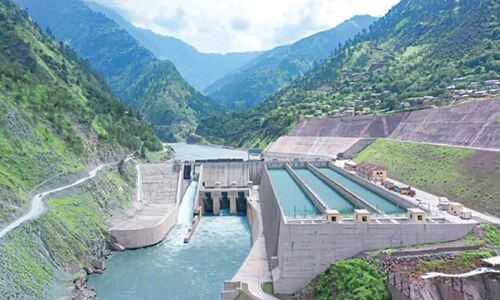THE BBC has reported that a group of British MPs have asked the British “government to withhold extra aid to Pakistan unless the country does more to gather taxes from its wealthier citizens”.
This will evoke a strong reaction in many circles in Pakistan. It is shocking that we have shameless people here — many having been associated with policymaking — who treat foreign aid as a yardstick to measure the success or otherwise of Islamabad’s foreign policy.
They have no qualms about going with the begging bowl in hand to foreign capitals. They will be irked by the British MPs’ statement no doubt. Some will see it as an anti-poor stance.
Anyone who understands the dynamics of international politics knows that foreign aid always comes with strings attached, even when they are invisible. Sometimes the conditions are tough, but implicit, and they actually harm the country’s economy. Examples are legion of how ill-suited projects have added to the country’s debt burden without any benefits having accrued to the recipient country.
Worse still, a prolonged unequal relationship of dependency between the aid giver and the recipient spanning an indefinite period of time can actually reduce the weaker partner to a client state, something like the banana republics of Latin America of yore. This relationship enables the aid giver to exercise control over the smaller country.
This reminds me of the words of wisdom coming from our world-renowned scholar of anthropology, Hamza Alavi, who wrote in 1961 that the goal of development of a balanced economy is distorted by the pressures which are brought to bear upon the planners when aid givers are involved. Needless to say the pressures are greater in military and security matters.
More upsetting are the changes that have come in the psyche of our leaders as well as the people. Initially a loss of self-esteem was the price we paid for accepting foreign aid. That also brought a sense of embarrassment.
There was a time when no political leader would ever admit publicly that he was toeing an aid giver’s line as he was under pressure. Now no one conceals the strings and aid is regarded as a matter of right. Aid has made us a nation of beggars. There is no loss of dignity involved when ‘aid’ is sought and accepted. Worse still, a lot of this aid is embezzled and squandered brazenly. An abundance of liquidity has fuelled corruption and ostentation.
There are times when economic contingency demands that aid be accepted. But it should be for a defined period and to tide over an unforeseen emergency the country is facing. To make the national economy dependent on foreign resources on a continuing basis for current expenditures is simply unforgivable. We need planners with self-respect who do not hold this nation of 180 million hostage to foreign governments with their own agendas.
There is also the moral dimension that cannot be ignored. The BBC reported, “The International Development Committee said British taxpayers should not be paying for health and education in Pakistan while rich Pakistanis were paying little tax. They also urged ministers to ensure aid was focused on anti-corruption efforts”.
This is very telling as it reflects on the dichotomy this country is saddled with. On the one hand, we have filthy rich leaders and businessmen who do not even file their income tax returns. On the other hand, some economists claim there are up to 120 million or so men, women and children who live below the poverty line — not because the country lacks resources but because of unequal distribution of wealth and the refusal of the rich to pay their taxes.
There are others who have robbed the banks of billions in the form of loans that are not repaid. Since they are also policymakers they bend and twist rules to their advantage. Can they be condoned for whitewashing their sins simply because they claim to be the elected representatives and technically have the power to set the rules?
It all boils down to tax reforms, an honest tax collection machinery, and, above all, good governance. The BBC report said that only 768,000 individuals pay income tax in Pakistan. We know that others with clout, especially the political elite, navigate their way round the tax officers or enter into agreements with them. Since they also control the levers of power they ensure that they escape direct taxation. That is why indirect taxation is so high — 62 per cent of all revenues collected. But indirect taxation amounts to taxing the poor.
The fact is that not all people lack social responsibility. It is a paradox that many who evade taxes are extremely generous in the charity they give, which places Pakistan at the top of the list when it comes to philanthropy. It is basically a lack of trust in the government which is known to be inefficient and corrupt that leads many to tax evasion.
The political elite is, however, in a position to lead the reform process. Change has to start from the top and those who lead this process must be on the moral high ground themselves.
Note: Last week I erred in my reference to the Population Council. It is a non-governmental organisation working globally in 15 countries, with its headquarters in New York.










































